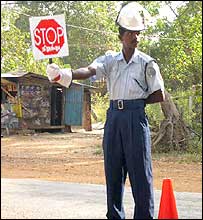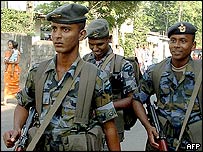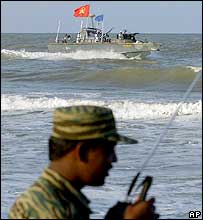Sri Lanka's Only Hope for Peace
by Paul Danahar, BBC South Asia Bureau Editor
The Sri Lankan government and Tamil Tiger rebels start their first direct talks for three years on Wednesday. The BBC assesses why they are so important.
 |
| The Tigers have their own police in areas under their control |
Whether the Sri Lankan government likes it or not - and they do not - the Tamil Tigers have established a de facto state in the north-east of the country.
When you drive through the "border" post into their territory, you have to set your watch back half-an-hour to Tiger time. Here, the Tigers are running everything and they let you know it.
During a recent visit, as I drove down a quiet country road, a Tamil Tiger policeman took out his gun, took deliberate aim at my vehicle and pulled the trigger.
My driver tried to swerve but it was too late, we were hit - with a speeding fine.
There aren't many rebel groups that take traffic violations seriously.
The Tigers are still banned in the US and UK as a terrorist organisation.
Yet it is one of the absurdities of the situation in Sri Lanka that you can find yourself debating the finer points of highway etiquette with a group better known for its devastating use of suicide bombers.
Lost opportunity
It's because the situation in Sri Lanka is so unlike anywhere else in the world that the problem is so intractable.
It's not for want of trying. The Norwegian minister for international development, Eric Solheim, took six months off work to try to sort the problem out.
That was seven years ago.
Many believe the best opportunity to solve the crisis came out of tragedy.
The Asian tsunami devastated the coastline in Tamil Tiger areas. For the first time, the Tigers needed help.
More importantly, for the first time they asked for help not just from the outside world in general but from Colombo in particular.
It was an opportunity for politicians from all sides of the Colombo polity to rise to the occasion. And in the minds of pretty much everyone involved in the peace process, they blew it.
Squabbling
As ordinary Tamils struggled to survive in their makeshift camps, the government and the Tigers squabbled for months about how the aid should be distributed.
 |
| A change in mindset on both sides could halt a march back to war |
When a deal was reached, it caused a split in the governing coalition and then the Supreme Court suspended it.
If that wasn't bad enough, analysts say, a chance to pull the Tigers out of their bubble and introduce to them to the realities of the outside world was squandered too.
People like the UN Secretary General, Kofi Annan, were denied permission to visit the affected Tamil areas.
The Tamil Tigers, at their most vulnerable and probably most acquiescent, were ignored and isolated just when they were reaching out.
It was considered by many observers to be just the latest example of politicians in the capital putting short-term political gain ahead of the quest for long-term peace.
'Political immaturity'
This week's talks are not about moving the peace process forward but saving the present ceasefire from collapse. Both sides have been busy shaking its foundation.
The army were accused of using the lull in fighting to encourage the renegade rebel, Col Karuna, to split from the group and wage covert war against them in the east.
The Tigers blatantly assassinated old enemies. But the root causes of the problem have to be tackled eventually and for that, a fundamental change in mindset is required from both sides.
 |
| The Tigers are wealthy enough to afford their own navy |
A diplomat working in the region told me recently that whilst acknowledging their "evil" acts, one must accept that the Tigers are the world's most sophisticated guerrilla organisation.
The Tamil diaspora, which has been hugely successful around the world, has also made the Tigers one of the richest militant groups, one that has its own navy and can afford long protracted battles.
But if they are brilliant guerrillas, the diplomat said, they are also supremely bad politicians.
He believes that the Tamil boycott of last year's presidential elections was not part of a cunning plan but an act of political immaturity.
It snatched the presidency from Ranil Wickramasinghe, the former prime minister who negotiated the 2002 ceasefire, and handed it to Mahinda Rajapakse, who campaigned on a hardline ticket.
Things have been sliding downhill ever since.
But, analysts say, if the Tigers don't have the political maturity now to move away from violence, they won't ever get it if they are kept isolated from the outside world.
It's a tough thing to ask the politicians to do because the Sri Lankan press are notorious for savaging anyone who suggests compromise.
But diplomats believe that until the Colombo polity shows it wants to help the Tigers make the transformation from the bullet to the ballot box, the deadlock cannot be broken.
|  Home
Home Archives
Archives Home
Home Archives
Archives